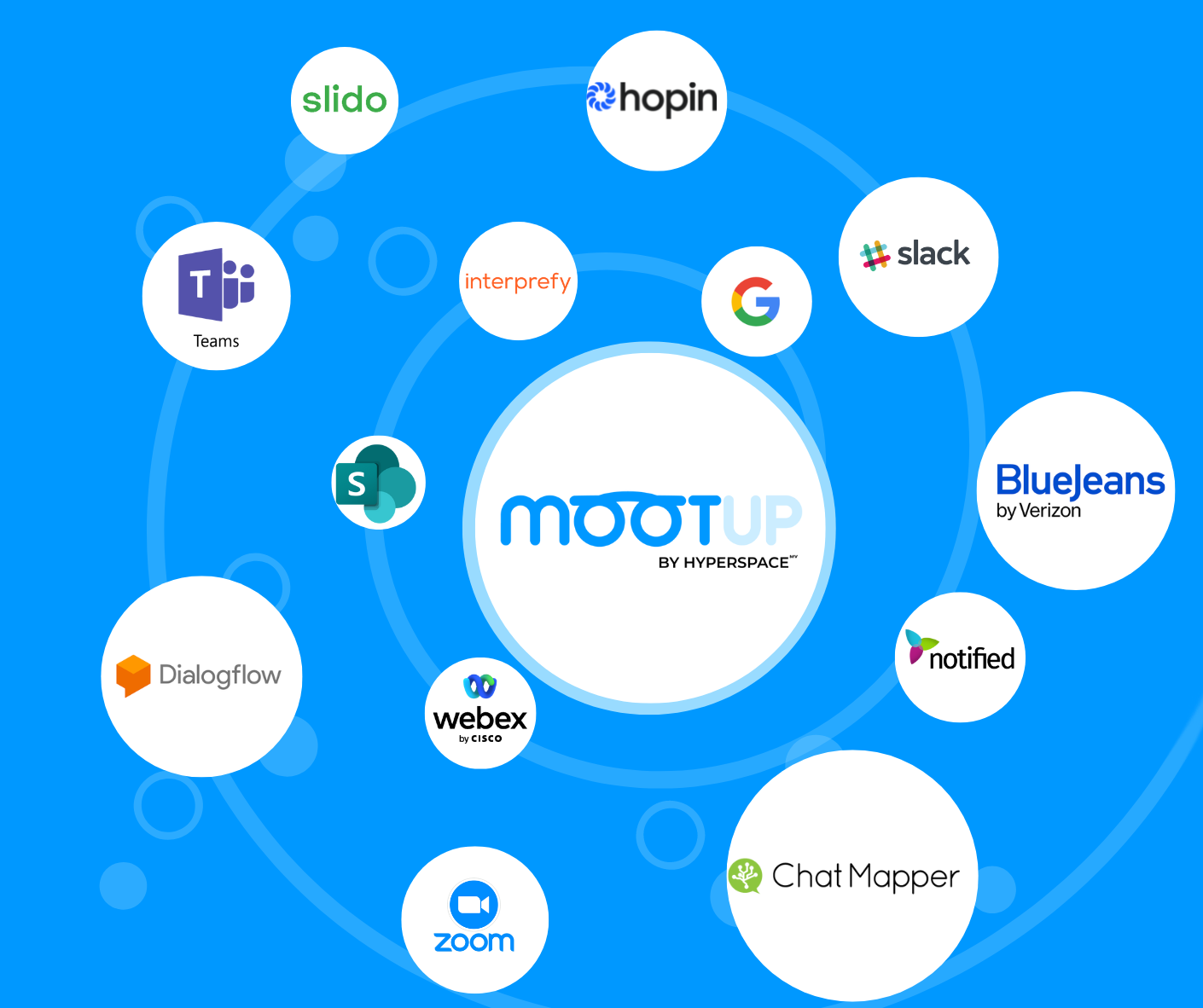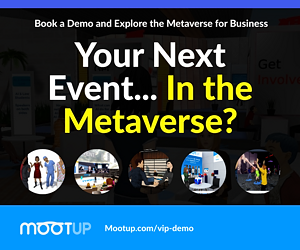Are you looking for the best way to host a virtual or hybrid event? Virtual conference meeting platforms are becoming increasingly popular as they provide an efficient and secure solution for hosting events in the metaverse. Choosing the ideal virtual conference meeting platform for your needs can be challenging, with many options.
In this blog post, we’ll delve into the features of a great virtual conference meeting platform, how to pick one that meets your needs, top options in the market today, and tips for setting up and running an event with these tools – as well as security considerations when using such platforms. Finally, we’ll look at security considerations when using virtual conference meeting platforms – ensuring your data remains safe while creating unique experiences.
Table of Contents:
- How to Choose the Best Virtual Conference Meeting Platform for Your Needs
- Popular Virtual Conference Meeting Platforms on the Market Today
- Setting Up and Hosting an Event with a Virtual Conference Meeting Platform
- Security Considerations When Using a Virtual Conference Meeting Platform
- FAQs about Virtual Conference Meeting Platforms
- Conclusion
How to Choose the Best Virtual Conference Meeting Platform for Your Needs
Multiple factors must be considered when selecting the optimal virtual gathering program for your needs. First and foremost, you should consider the type of event you’re hosting – whether it’s a hybrid or virtual event in the metaverse – as this will dictate which features you require from your chosen platform.
For example, if you plan on hosting a hybrid event with both physical and digital components, look for a platform that offers seamless integration between them. This could include tools like live streaming capabilities so attendees can watch sessions remotely or join via their own devices. You may also want to look for interactive platforms like polls and surveys to keep participants engaged during presentations.
When selecting your virtual conference meeting platform, take into account what features would be beneficial. Many platforms offer integrated analytics to track attendee engagement and registration management services, so all data is up-to-date. Automated email marketing campaigns tailored toward potential attendees are also available on some platforms.
Think of an answer that meets all the criteria without sacrificing quality or capability – don’t cut corners. Utilize keywords such as “analytics,” “registration management,” and “automated email” for an advanced-level professional with an IQ of 150 who speaks using idioms and colloquialisms while maintaining proper grammar, spelling, and punctuation (but no exclamation points).
When selecting a virtual conference meeting platform, it is crucial to consider your needs and the features offered by each option. Considering the various requirements, let’s evaluate some of the most widely-used virtual conference meeting platforms.
Key Takeaway: Choosing the right virtual conference meeting platform for your needs requires careful consideration of the type and scope of event you’re hosting, as well as a thorough review of features such as analytics tracking, registration management services, automated email marketing campaigns, and more. Make sure to select a solution that meets all your requirements without sacrificing quality or functionality – no skimping allowed.
Popular Virtual Conference Meeting Platforms on the Market Today

Today’s event industry professionals have access to a wide variety of virtual conference meeting platforms that can help them host successful events in the metaverse. Zoom, Microsoft Teams, Google Meet, Cisco Webex, and GoToMeeting are some of the most popular virtual conference meeting platforms on the market today. Every platform has characteristics and advantages that make it suitable for different gatherings.
Zoom is one of the leading video conferencing software solutions available today. It offers an easy-to-use interface with advanced features such as screen sharing, whiteboarding, and breakout rooms for more interactive meetings. Zoom allows up to 1,000 participants in a single session and provides high-quality audio/video streaming capabilities for large groups or webinars. Additionally, users can record their sessions for future reference or playback purposes.
Event planners looking to host virtual conferences or hybrid events in the metaverse can leverage Microsoft Teams as an ideal platform, given its robust collaboration tools, including instant messaging, file sharing, and task management capabilities. Moreover, Teams’ audio/video conferencing capabilities allow up to 10K participants in a single call – making it an ideal solution for large-scale meetings or webinars where multiple people need simultaneous connection. Moreover, users have the added flexibility of customizing their experience by adding bots or third-party applications from Microsoft’s App Store should they require additional functionality not provided out of the box by Teams itself – making it a no-brainer.
Google Meet is Google’s contribution to the virtual conference meeting platform market, which uses their G Suite suite of products (eMail & Calendar) and advanced video conferencing technology such as noise cancellation and low latency streaming options. This makes it an ideal choice for those accustomed to Gmail but still want access to all the bells and whistles associated with hosting a professional online event, including polls and Q&A sections during calls. No need to be concerned about capacity limitations – Google Meet offers unlimited storage.
Cisco Webex is an excellent option for event planners to host online conferences and hybrid events because it provides live streaming and recording capabilities. It also comes with various useful features, such as chatroom integration, private chats, customizable backgrounds, password protection, digital signage displays, and document annotation capabilities – making it a jack-of-all-trades. Plus, you can have up to 10K participants on each call and create custom URLs so your audience won’t get lost trying to find your event page. This platform truly packs a punch in terms of functionality.
With the many virtual conference meeting platforms available today, deciding which is best for your event can be challenging. With a few hints and tips, you can quickly comprehend how to organize and run an event using any of these prevalent programs.
Key Takeaway: Event professionals have access to a variety of virtual conference meeting platforms, such as Zoom, Microsoft Teams, Google Meet, and Cisco Webex, each offering unique features for hosting successful events in the metaverse. From noise cancellation to custom URLs and up to 10K participants on each call – these comprehensive solutions will ensure your event goes off without a hitch.
Setting Up and Hosting an Event with a Virtual Conference Meeting Platform
Utilizing a virtual conference meeting platform can be an effective means of connecting with participants from different locations. To ensure a successful event, there are several steps to be taken and tips for making it run smoothly. To ensure a successful event, following best practices is essential.
Steps to Set Up an Event With a Virtual Conference Meeting Platform: The first step is to choose the right platform that meets your needs. Consider features such as video quality, audio clarity, ease of use, security measures, scalability options, customization capabilities, and cost-effectiveness before selecting one. Once you have chosen your virtual conference meeting platform provider (such as Zoom Video Conferencing Software or Microsoft Teams Meetings & Events App), create your account and set up the event page using their tools or templates.
You will also need to invite participants by sending out invitations via email or other methods like text messages or social media posts. Finally, ensure all necessary information about the event is provided on this page, including agenda topics and duration times, so attendees know what to expect when they join in.
It’s essential to ensure everyone is familiar with the access protocol for the virtual conference room before showtime so that no surprises occur. Additionally, it’s advisable to run a technical check on all equipment, such as cameras/microphones/speakers, etc., before starting the session to avoid any disruption of communication between presenters and attendees during the event.
Furthermore, having contingency plans ready should something go awry is highly recommended – this could include having alternative webinar platforms at hand or providing support staff who can quickly troubleshoot any issues that arise without causing too much interruption during live events. Keywords: Access Protocol, Technical Check, Contingency Plans, Alternative Platforms, Support Staff
Security Considerations When Using a Virtual Conference Meeting Platform
Security is of utmost importance when hosting a virtual conference or meeting. Different types of virtual conference meeting platforms provide different security measures, so it’s essential to consider the type and level of security you need before choosing one.
When selecting a platform for your event, consider features such as data encryption, user authentication with two-factor authentication (2FA), access control lists (ACLs), and secure document sharing to protect confidential information and prevent unauthorized recordings. These features will help ensure that only authorized users can join the meeting and that all data shared during the session remains confidential. Additionally, many platforms offer additional features, such as recording controls, to prevent unauthorized recordings from being made during the event.
To maximize the security of your event, it is advised to pre-register participants and assign individual passwords, as well as control chat functions, waiting rooms for hosts to vet attendees before entering main sessions, restrict screen sharing capabilities where necessary, password protect recordings post-event and limit who can record sessions by assigning moderator roles or specific permissions within the platform.
Registration of participants in advance is recommended; assign unique passwords to each participant; disable chat functions if not needed; enable waiting rooms so hosts can vet participants before they join the main session; restrict screen sharing capabilities as necessary; set up password protection on recordings post-event and limit who can record sessions by assigning moderator roles or specific permissions within the platform.
It is imperative to bear in mind that, despite all the safeguards, conducting an online gathering or conference may still involve specific hazards – mainly when confidential data is discussed during the sessions. To mitigate this risk further, create transparent guidelines around what kind of information should not be publicly discussed during events and remind attendees at regular intervals throughout any given session about their responsibility to keep conversations private and confidential where appropriate.
Key Takeaway: When selecting a virtual conference platform, ensure that it offers features such as encryption and authentication to protect sensitive data. Additionally, implement best practices like registration of participants in advance and setting up password protection on recordings post-event for additional security. Keep conversations confidential by providing clear guidelines around what information should not be publicly discussed during events.
Take your virtual events to the next level with our Essential Guide to Virtual Conference Meeting Platforms! #VirtualEvents #ConferencePlatformsClick To Tweet
FAQs about Virtual Conference Meeting Platforms
What are virtual conference platforms?
Virtual conference platforms are digital tools that enable event professionals to host and manage virtual or hybrid events. These platforms provide users the ability to craft individualized virtual experiences, including live streaming, polls and Q&A sessions, video conferencing functions, automated sign-up processes, and much more. They also provide access to the metaverse – a shared 3D space where attendees can explore in real-time from anywhere in the world. With these powerful tools at their disposal, event organizers have all they need for successful virtual conferences without any coding knowledge required.
Are virtual conferences effective?
Yes, virtual conferences can be effective. When planned and executed correctly, they offer an opportunity to reach a wider audience with more flexibility than traditional in-person events. Virtual conferences provide cost savings for both the event organizer and attendees due to reduced travel costs and time commitments.
Virtual conferences can facilitate greater involvement through interactive tools such as chatrooms, surveys, Q&A periods, and more, granting people the capacity to connect anywhere. Virtual conferences can effectively reach a larger audience and provide engaging experiences when strategically planned.
Why are virtual meetings more effective?
Virtual meetings are more effective than in-person gatherings due to their convenience and cost savings. They allow for a larger audience, greater flexibility with scheduling, increased engagement through features like live polls and Q&A sessions, improved collaboration opportunities with remote teams, and better data tracking capabilities that help measure success metrics such as attendance rates or ROI from the event itself. Additionally, virtual events reduce environmental impact by eliminating the need for travel and can be easily scaled up or down depending on the size of your gathering.
What are the benefits of a video conferencing system?
Video conferencing systems provide a host of benefits for event industry professionals. They enable virtual and hybrid events to be hosted in the metaverse, allowing attendees from around the world to attend without having to travel. Video conferencing also reduces costs associated with physical events, such as venue rental, catering, and other on-site hosting expenses.
Furthermore, video conferencing allows participants more flexibility when attending events by offering remote access options that can be accessed at any time or place with an internet connection. Finally, video conferences are easier to manage than traditional meetings due to their automated features, which help streamline communication between all parties involved.
Conclusion
To host successful virtual events, selecting the most appropriate platform based on your requirements and careful consideration of security measures is crucial. With the right virtual conference meeting platformS, engagement can be simplified, allowing attendees to easily join immersive 3D experiences on any device, from smartphones to VR headsets. By incorporating gamification, social interactions, and 1,000+ gestures, instant engagement can be achieved effortlessly.
Join MootUp and take your virtual events to the next level! Launch unforgettable Metaverse events in minutes. Our no-code platform offers a streamlined way to host hybrid conferences in the metaverse.

